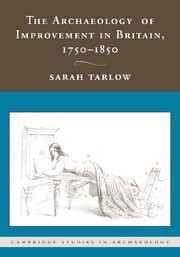TWO - AGRICULTURAL IMPROVEMENT
Published online by Cambridge University Press: 23 July 2009
Summary
… all lands are capable of improvement, none being so profitable by nature as they are capable of being made by man's assistance.
Hitt 1761: 1Take a train from Birmingham to Peterborough, across the fields and coverts of the English midlands. The historical landscape is obvious in the large numbers of moated houses, ridge and furrow field systems and the vernacular architecture of the villages and small towns through which the railway passes. Yet there is a historical period which is even more evident, if its very familiarity does not cause us to overlook it. The fields of productive arable and rich grazing; the straight, hawthorn hedges around rectilinear fields; the isolated rural farm houses connected by straight roads; even the railway itself: all were largely products of the eighteenth and nineteenth centuries. In fact it is only the particular nature of eighteenth and nineteenth-century agricultural practice in this area that enables the landscape archaeology of earlier periods to survive here so clearly; the late enclosure of open fields, and the relative infrequency of deep ploughing mean that the ridge and furrow of earlier fields is easy to spot, as are the deserted villages, moated manors and other medieval earthworks. The efforts of eighteenth and nineteenth-century farmers to improve their land and their methods of agricultural production left enduring marks on the landscape and we will begin our exploration of Improvement by assessing the traces it has left on our rural landscape.
- Type
- Chapter
- Information
- The Archaeology of Improvement in Britain, 1750–1850 , pp. 34 - 66Publisher: Cambridge University PressPrint publication year: 2007

